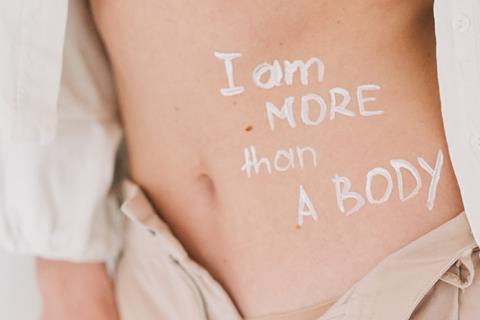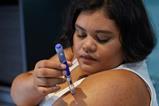Mental health campaigner Hope Virgo unpacks why we are seeking too much value from our physical bodies and what we can do about it.
Brought to you by Mercy Ships

The obsession with food, as well as shrinking ourselves and our bodies, is normalising eating disorders globally, and having hugely negative impacts on our mental health – taking many down a dangerous route. But while we know that social media isn’t reality and know how bad it is to compare ourselves on Instagram, we still do it. Why are we letting it affect our mood and behaviours? Why are we letting influencers with no nutritional qualifications tell us what we should and shouldn’t be eating?
Each day we are bombarded by messaging which, for some of us, starts a negative narrative. For those of us of which this is true, we look enviously at those who don’t seem to have this narrative.
Struggling with summertime
It is no surprise that in a world where we can order weight-loss drugs, and find the latest cosmetic surgery on the high street, that there are more people struggling with what they look like and finding pressure from magazines, social media and books.
I lived so much of my life like this, and even over the last year since having a baby I was convinced that if I just did a huge ASOS order, and changed my external appearance, that maybe everything would feel better and be more manageable. While there is something in the positives of getting dressed and keeping hygiene up, when did society start to believe that to be accepted or ‘right’ we have to have a certain body? And why do we let the onset of summer add even more pressure to ourselves?
Grace Shepphard, who is in recovery from an eating disorder, says: “I find the change in season from winter to summer really hard. As it gets warmer, not being able to cover up in as many layers feels exposing and vulnerable. As I’ve been recovering from an eating disorder over the past few years my body has changed quite a lot. The heat makes me more aware of my body taking up space and can feel intolerable.”
What’s behind our struggles
The eating disorder nutritionist, Pixie Turner, took to Instagram recently to explain: “Body image is an external manifestation of an internal struggle, because our bodies are seen as the stage upon which we enact our moral value. Therefore, your body is your worth, and if something feels wrong, changing your body feels like a solution. A lot of body stuff is about way more than body stuff.”
This is something I have seen in my own experiences with my body. I was sexually abused as a child and it left me with these feelings that there was something ‘wrong’ with me. I was wrong so I wondered: What should I do? Well society tells me it must be my body that is wrong so I looked to fix that.
I remember all the Christian meetings I have sat in being told to love my body because God made it. The shame that this inflicted on me was huge. I spent a lot of life thinking I was sinning every time I had a negative thought about my body and at the same time praying that these negative thoughts would just go. Why couldn’t I be comfortable in my own skin? We all know being a Christian doesn’t immediately take away the bad body image days, and as individuals we need to find a way to manage them.
Finding a way through
Grace said: “I’ve been on a journey with it over the last few years. Initially when I made the decision to go all into recovery from my eating disorder I knew I had to let go of all of me into God’s hands. I knew I couldn’t be well holding on to any part of anorexia so it meant letting go and allowing God to help me through the changes. The main thing that has helped me is knowing that my body is God’s. I need to feed it, rest it, move it and honour it in order to give God glory. I am beginning to see that I have been made good, despite the negative chatter in my own mind. The verse in Psalm 139: ‘I am fearfully and wonderfully made’ [v14] is one I repeat over myself, knowing and believing that I am God’s good creation, made beautifully for His purpose.” Bible verses and mantras have been key for me too!
Lauren Collins is also in recovery from an eating disorder. She told me: “In terms of my body image I feel that I have struggled to greater or lesser degrees since about the age of seven, when I began comparing my body to other people’s and evaluating mine as somehow not as good. This grew and mixed with other struggles.
I eventually developed an eating disorder and as part of my work to recover from that I had to look at my relationship with my body. I became a Christian and over time God has taught me more and more and this has greatly impacted my relationship with my body for the better.”
Body image really does impact all of us and, while our faith is the anchor, we need to think about what we can do practically on those difficult body days. “What I now do is put on something I know I feel comfortable in and just get outside. Away from mirrors, away from the confines of my flat in my own head,” says Grace. “I may try to arrange to meet a friend, or do something I enjoy to keep my mind distracted.
I love to climb or walk outside, so either of these activities help remind me what my body can do rather than what it looks like. It doesn’t necessarily have to be a sport that reminds us of just how marvellous our bodies are; it could be having a baby or remembering how our bodies have healed from illness which helps keep things in perspective. Our bodies are much more than just the external appearance.”
Lauren explained: “On harder body days I remember that body image can be affected by what is happening in my life and emotions so if I am able I look for what might be happening to impact my body image. I find understanding can help me. I make sure that, despite how I may feel in my body, I continue to eat well and give my body what it needs. I will also ask for support in doing this and share with someone close to me my current struggle(s).
I will try to engage in things that hold my attention and things that I value. I also remember that I would never say all the horrible things I say about my body to someone else and then try to speak to myself about my body with a little more compassion. I also remember the truth in God’s word and pray that he would help me.”
Accepting and loving ourselves
So, as the sunshine starts to warm our days, instead of looking down at yourself and thinking you would be happier with a few pounds off, own your body!
Let’s also stop walking into spaces and judging everyone around us because every single one of us is so much more interesting than our bodies.
And let’s remember what Grace told me: “It’s a slow process but I’m starting to feel more comfortable in my own skin, seeing myself for more than just my body and remembering how God sees me. Our bodies will change as we age, and accepting that is really important. What I find so beautiful about God is how he holds us through everything. First and foremost our identity is found in him.
“As I’ve begun to let go of the tight grip I have over my body, what I eat and how I look, I’ve held onto that truth that I am a loved daughter of God and that’s kept me grounded. Other people’s opinions and comments don’t matter so much anymore. I still have bad days, but I remember what God says about me and choose to partner with the truth, get out of my own head and remember how remarkable my body really is.”
It’s important to remember that bad body image on its own doesn’t lead to an eating disorder and eating disorders are far more complex than body image.
If you have experienced any of the issues discussed in this article and need support please do reach out to the confidential Premier Helpline on 0300 111 0101, 9am to 5pm Monday to Friday.

































No comments yet